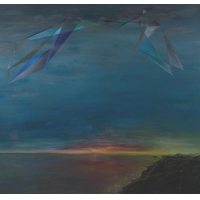Home » Jazz Articles » Album Review » Lucas Pino: That's a Computer
Lucas Pino: That's a Computer
A five-year, monthly residency at Smalls Jazz Club in New York City has made the band tight, gutsy and barely able to contain its enthusiasm. Everyone sounds deeply invested in and emotionally connected to the music. The things that the Nonet execute with aplomb—changes in tempo, shifting time signatures, subtle and radical dynamic changes, pregnant pauses, a wide variety of textures, long and short themes, brief interludes, as well as riffs that complement and stimulate the soloists—are all essential, yet the bottom line is that every cut is companionable and absorbing, not to mention frequently exhilarating.
That's A Computer contains too many stellar moments to fit into a short review; besides, perhaps they're best discovered by each listener. Nonetheless, several examples merit mention. The tranquil effect of unhurried interplay by the rhythm section (Glenn Zaleski on piano, Desmond White on bass, Jimmy Macbride on drums, and Sarnecki's guitar) introduces LoRe's "Antiquity." Changes in tempo (fast to slow-to-medium) and feel (straight-ahead swing to funk and back) on Pino's "Horse Of A Different Color" insinuate inevitability, not contrivance. Sarnecki's crystalline tone enlivens every track, particularly when coupled with one other instrument, most often Zaleski's piano. A fog of overlapping long tones by the horns, minus the rhythm section, initiates Pino's ballad "Film At 11." The peaceful dialogue between the wordless vocal of Camila Meza and the horns breaks the silence at the onset of Pino's "Frustrations." Sarnecki layers terse, kinetic themes that jostle one another, complete for attention, and bring on the wild ride of "Sueno De Gatos."
The theme from "Baseball Simulator 1000," a classic video game of the late 1980s, amounts to ninety-five seconds of jubilant celebration. Inspired by Macbride's deep pocket funk drums and the horns' jaunty, persistent statement of the theme, Pino's tenor gleefully spits out a number of acerbic phrases. It's a fitting conclusion to an extraordinary recording.
Track Listing
Antiquity; Horse of a Different Color; Film at 11; Look into My Eyes; Frustrations; Sueno de Gatos; Baseball Simulator 1000.
Personnel
Lucas Pino
saxophoneMat Jodrell
trumpetAlex LoRe
saxophone, altoAndrew Gutauskas
saxophone, baritoneNick Finzer
tromboneRafal Sarnecki
guitarGlenn Zaleski
pianoDesmond White
bassJimmy Macbride
drumsCamila Meza
vocalsAlbum information
Title: That's a Computer | Year Released: 2018 | Record Label: Outside In Music
< Previous
Gourmet At April Jazz Club
Next >
New Thing
Comments
Tags
Lucas Pino
Album Reviews
David A. Orthmann
Braithwaite & Katz Communications
That's a Computer
Outside In Music
Alex LoRe
Rafal Sarnecki
Glenn Zaleski
Desmond White
Jimmy MacBride
Camila Meza
For the Love of Jazz
 All About Jazz has been a pillar of jazz since 1995, championing it as an art form and, more importantly, supporting the musicians who create it. Our enduring commitment has made "AAJ" one of the most culturally important websites of its kind, read by hundreds of thousands of fans, musicians and industry figures every month.
All About Jazz has been a pillar of jazz since 1995, championing it as an art form and, more importantly, supporting the musicians who create it. Our enduring commitment has made "AAJ" one of the most culturally important websites of its kind, read by hundreds of thousands of fans, musicians and industry figures every month.





























